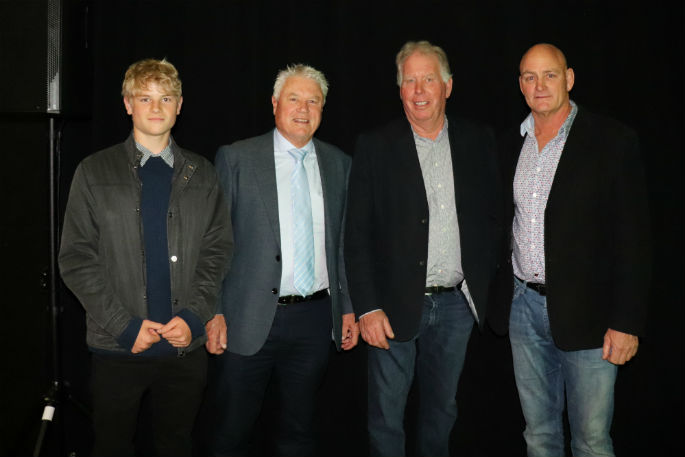On Friday, the kiwifruit industry celebrated the 60th anniversary of renaming the kiwifruit in 1959.
On Friday August 9, the Te Puke War Memorial Hall was transformed into a sell-out event compered by Miriama Smith, with many local pioneer kiwifruit families, including Don Turner and his son David in attendance.
New Zealand began exporting the fruit to the US in 1959. Don Turner says the fruit had its name changed from Chinese gooseberry to kiwifruit because gooseberries were known to have anthracnose disease which would pose a marketing issue for the US importers.
'The name change was attributed to my uncle Jack Turner,” says Don, 'but it was actually a management meeting which included his father Harvey, Jack and my father Graham. They were considering the correspondence that had come in from the importers when we asked them if they'd be ready to receive some Chinese gooseberries.
'The impetus came from the American importers both in Honolulu and San Francisco who were Turners and Growers agents for other products. They said that gooseberries harbour the disease anthracnose and ‘we wouldn't want to confuse that because they're not a gooseberry, so could you come up with a different name for the fruit?'
It has been commonly report that the name change came about because the late 50s was near the height of the Cold War.
'They didn't say anything about China being the enemy or person no grata but you could infer that that might have been an unfortunate part of the previous name,” says Don.
'It was a quarantine issue that they immediately came back with, and there was the suggestion of a different name. So we came back with a different name and they said ‘well how about something with a Maori connotation', and so from there the word kiwifruit was offered. They thought that was great and so they received fruit under the kiwifruit name in 1959.
Te Puke, where New Zealand's kiwifruit industry began, markets itself as the 'Kiwifruit Capital of the World', and it was the appropriate place to celebrate the 60 years of renaming kiwifruit.
Tables for ten seated much of the kiwifruit industry including groups from Zespri, Seeka, Trevelyan's Pack and Cool, EastPack and Eurofins.
Peter Burt, whose father Bob Burt was a key figure in the early days and Rob Bayly of the McLoughlin family were also present.
Well-known Te Puke kiwifruit farmer Peter McLoughlin, known as Peter Mac, was one of the early innovative pioneers of kiwifruit growing.
'Another thing about the name, is that the Fruitgrowers Federation which had been in business for six years weren't interested in changing the name,” says Don. 'They were quite happy to keep going on Chinese gooseberries and didn't want to change it.
'It was only pressure from the industry as a whole that made them change at all. They started by using kiwi berries for a year or two, but by about the mid-60s, they converted.
'Turners and Growers were very happy that they did. Turners and Growers wanted everybody to use the same name otherwise it would have been total confusion in the market place. But it wasn't something people just adopted straight away.”
Others who attended were some of the instrumental organisers from the kiwifruit festival era - Shirley and Des McGregor, Dianne Leach, Barb Olderman and Jo Page; along with some of the previously crowned Kiwifruit Queens.
The Te Puke War Memorial Hall was transformed with a large toe toe display and hanging chandelier as a dramatic backdrop to the stage area, created by Te Puke florist Murray Howell.
Event organizers, Rebecca Larsen from EPIC Te Puke, and Kassie Ellis from Creative Te Puke aimed to bring back Kiwifruit Ambassador celebrations in style after a nine-year reprieve with a focus on community leadership and talent.
'We had eight very worthy contestants, sharing their work and talent on the night,” says Rebecca.
The Kiwifruit Ambassador 2019 was awarded to 18-year-old Awatea Waaka, who aspires to be a police officer and Maori female role model.

